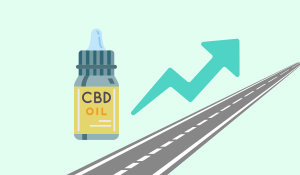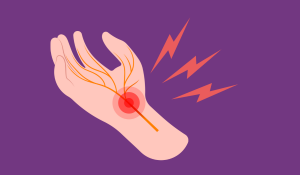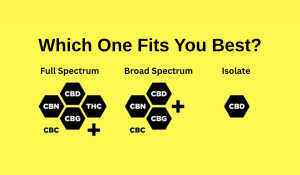Imagine you’re scrolling through social media and see yet another ad for CBD oil, promising relief from everything from anxiety to chronic pain. It sounds like a miracle cure, right? But before you jump to the conclusion, it’s crucial to understand the potential downsides and the promised benefits. With the CBD market booming, being an informed consumer is more important than ever. This article dives deep into the CBD side effects, risks of CBD, and CBD oil concerns, empowering you to make smart choices about your health.
While many people tolerate CBD well, it’s not without its potential drawbacks. Like any substance, CBD can cause side effects, some mild and others more serious.
These are the more common, less severe side effects you might experience:
These side effects are usually temporary and tend to subside as your body adjusts. But what about the more serious concerns?
Here is more about the more significant risks associated with CBD:
Many people opt for CBD oil, but this form of CBD comes with its own set of concerns, primarily related to quality control.
The CBD market isn’t as tightly regulated as other industries, which means product quality can vary wildly. Some CBD oils may contain contaminants like heavy metals or pesticides, inaccurate CBD concentrations (meaning you’re not getting what you paid for), or even undisclosed ingredients. This is why choosing products from reputable companies that conduct third-party lab testing is essential.
Finding the right CBD dosage is crucial. Too little, and you might not experience any benefits. Too much, and you could increase your risk of side effects. It’s generally recommended to start with a low dose and gradually increase it until you find what works best for you. This is a very individual process.
While numerous studies have explored the short-term effects of CBD, we know less about its long-term impact. More research is needed to understand the potential long-term effects of CBD use fully.
CBD and Pregnancy: A Definite No-Go
It’s strongly advised that pregnant or breastfeeding women avoid using CBD. There’s limited research on the effects of CBD on a developing fetus or infant.
CBD and Children: Proceed with Extreme Caution
While some studies have explored the use of CBD in children with specific medical conditions like epilepsy, it’s crucial to consult with a pediatrician before giving CBD to a child.
CBD and Mental Health: A Complex Relationship
Some people use CBD for anxiety or depression, but it’s important to understand that CBD is not a cure for mental health conditions. It’s essential to seek professional help from a qualified mental health professional for any mental health concerns. CBD might offer some support, but it’s not a replacement for therapy or other established treatments.
Navigating the CBD Market: Smart Shopping Tips
Choosing high-quality CBD products can be tricky, but here are some key things to look for:
Understanding CBD Regulations: A Patchwork of Laws
The legal status of CBD is a bit of a maze. It varies depending on the source of the CBD (hemp vs. marijuana) and the specific state or country. It’s crucial to be aware of the laws in your area.
CBD and Driving: Is it Safe to Get Behind the Wheel?
While CBD itself is non-intoxicating, it can cause drowsiness in some individuals. It’s best to avoid driving or operating heavy machinery until you know how CBD affects you personally.
When to Consult a Doctor About CBD Use: The Golden Rule
It’s always a good idea to chat with your doctor before starting any new supplement, including CBD. This is especially important if you have any underlying health conditions or are taking any medications. They can help you determine if CBD is right for you and advise you on the appropriate dosage.
Talking to Your Doctor About CBD: A Quick Guide
When talking to your doctor about CBD, be prepared to discuss:
Debunking Common CBD Myths: Separating Fact from Fiction
One common myth is that CBD is the same as marijuana. This is simply not true. CBD is a non-psychoactive compound found in cannabis plants, while marijuana refers to cannabis plants with high levels of THC, the psychoactive compound that causes the “high.”

Explore this cbd consumption methods tutorial and follow the step-by-step process to select, use, and verify the safest ways to consume CBD for wellness.
Read More
Learn what CBD edibles are, their main types, expected effects, legal status, safety factors, and how they compare to other forms of CBD.
Read More
Therapeutic Uses of CBD Managing Chronic Pain with CBD Struggling with chronic pain? CBD might help. Studies suggest it can reduce inflammation and alleviate discomfort,...
Read More
Just as CBD may help humans due to its interaction with the body’s endocannabinoid system, the same is true of dogs. CBD has the potential...
Read More
Cannabis has been used for millennia to treat numerous health conditions. Current research offers promising results on the effects of CBD oil on breast cancer.
Read More
What Is CBD for Cats? CBD (Cannabidiol) is a natural compound from hemp. It’s non-psychoactive, meaning your cat won’t get “high.” Instead, it works with...
Read More
1. Understanding Neuropathic Pain Neuropathic pain results from nerve damage or dysfunction, causing symptoms like burning, tingling, or sharp shooting pains. Common Causes: Symptoms Include:...
Read More
CBD for Pets: A Pet Parent’s Guide to Dosage We all want the best for our pets, especially when they’re struggling with pain, anxiety, or...
Read More
What Is Lupus? Lupus is a long-term autoimmune condition that can impact multiple organs, including the skin, heart, lungs, and kidneys. The most common type...
Read More
1. Full-Spectrum CBD: The All-In-One Option What it is: Contains CBD, minor cannabinoids, terpenes, flavonoids — and less than 0.3% THC. Why choose it: Promotes...
Read More